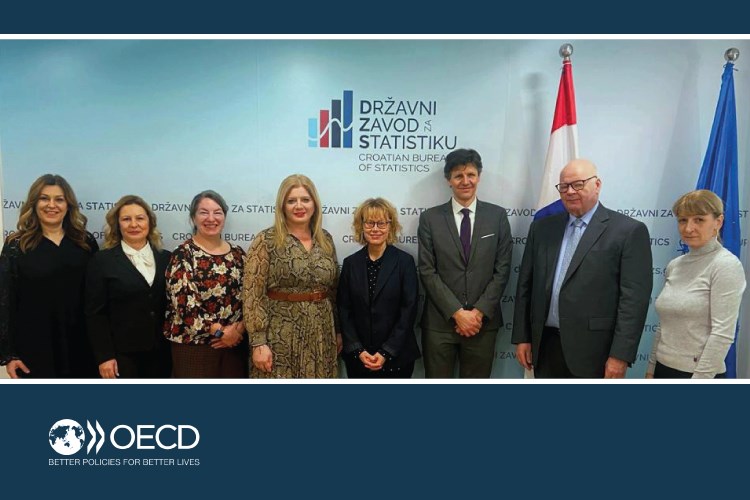- Published: 14.02.2024.
The second visit of the Committee on Statistics and Statistical Policy as part of the process of accession of the Republic of Croatia to the Organisation for Economic Co-operation and Development (OECD) begins
As part of the process of accession of the Republic of Croatia to the Organisation for Economic Co-operation and Development (OECD), the second visit of the Committee on Statistics and Statistical Policy to the Croatian Bureau of Statistics has begun, in order to review the national statistical system and official statistics of the Republic of Croatia. The visit takes place from 13 to 15 February 2024, and the main task is to assess the readiness and ability of the Croatian statistical system to fulfil its obligations to the OECD, which include the provision of short-term, structural and other analytical statistics and related methodological information necessary for adequate policy analysis and monitoring.
In the previous period, the Croatian Bureau of Statistics and other producers of official statistics filled out questionnaires about the readiness and abilities of the Croatian statistical system, and this visit will give the Committee on Statistics and Statistical Policy additional answers about the scope of work of the Croatian statistical system.
In addition to the members of the Committee on Statistics and Statistical Policy, Ms. Asa Johansson and Mr. Julien Dupont, the review team consists of three other representatives of national statistical offices, namely Ms. Brenda Bugge from Statistics Canada, Ms. Eveli Šokman from Statistics Estonia and Mr. Timo Koskimäki from Statistics Finland.
With the accession of the Republic of Croatia to the OECD, the Croatian Bureau of Statistics has the task of taking care of the legal and institutional framework for statistics, establishing and maintaining quality statistical and data infrastructures aligned with policies and good practices in OECD member countries, as well as integrating into the OECD reporting and information systems from the moment of accession.
We remind you that, on 25 January 2022, the OECD Council decided to open accession discussions with the Republic of Croatia, while on 10 June 2022, “Plan for the Process of Accession of the Republic of Croatia to the OECD” was adopted at the ministerial level. The overarching objective of the accession process is to achieve convergence of the Republic of Croatia with OECD standards, best policies and best practices, resulting in better outcomes for OECD member countries and their citizens.
News
In the previous period, the Croatian Bureau of Statistics and other producers of official statistics filled out questionnaires about the readiness and abilities of the Croatian statistical system, and this visit will give the Committee on Statistics and Statistical Policy additional answers about the scope of work of the Croatian statistical system.
In addition to the members of the Committee on Statistics and Statistical Policy, Ms. Asa Johansson and Mr. Julien Dupont, the review team consists of three other representatives of national statistical offices, namely Ms. Brenda Bugge from Statistics Canada, Ms. Eveli Šokman from Statistics Estonia and Mr. Timo Koskimäki from Statistics Finland.
With the accession of the Republic of Croatia to the OECD, the Croatian Bureau of Statistics has the task of taking care of the legal and institutional framework for statistics, establishing and maintaining quality statistical and data infrastructures aligned with policies and good practices in OECD member countries, as well as integrating into the OECD reporting and information systems from the moment of accession.
We remind you that, on 25 January 2022, the OECD Council decided to open accession discussions with the Republic of Croatia, while on 10 June 2022, “Plan for the Process of Accession of the Republic of Croatia to the OECD” was adopted at the ministerial level. The overarching objective of the accession process is to achieve convergence of the Republic of Croatia with OECD standards, best policies and best practices, resulting in better outcomes for OECD member countries and their citizens.
